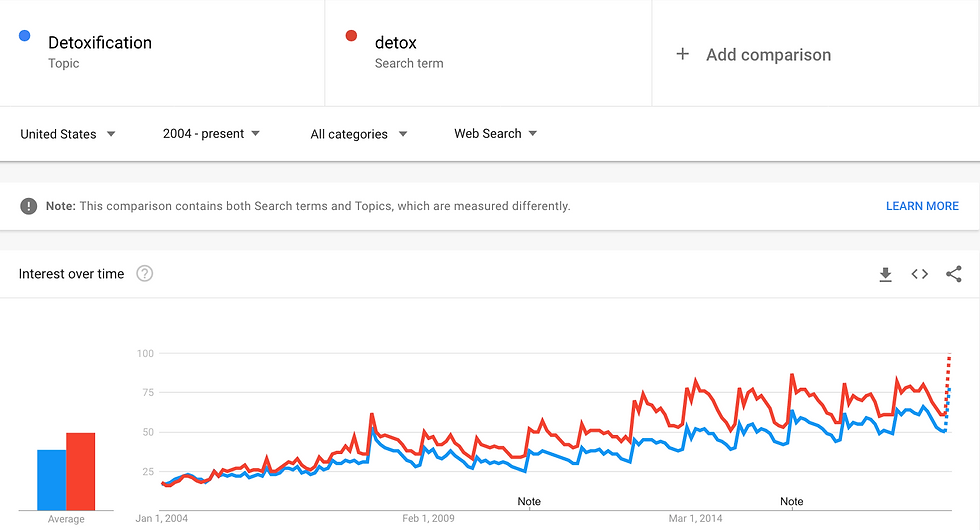As we all remember from high school English, Shakespeare wrote the iconic line, "O Acai, Acai, wherefore art thou Acai? Deny thy science and refuse thy sugar; or if thou wilt not, be but sworn my love and I’ll no longer be unhealthy." Wait. Are you cringing at tha----oh, look at those face creases and wrinkles! Have you tried apple cider vinegar? It's also the beginning of a new year. With weight loss goals in sight, maybe we should try out a juice cleanse to begin detoxing?
Cleansing and detoxifying have been major buzzwords that have grown in popularity over the last decade. The booming detox industry centers around the notion that our bodies build up unspecified "toxins," and although we have internal organs that have natural detoxifying abilities, various foods and products can enhance this process. Detoxifying options include foods and drinks that don't necessarily turn the head, like green tea, almonds, and avocados, but also showcase some obscure options that require explanation: acai, apple cider vinegar, and kale. The National Center for Complementary and Integrative Health, a division of the NIH, makes it clear that "there isn’t any convincing evidence that detox or cleansing programs actually remove toxins from your body or improve your health.²" In fact, they make the case to be wary about the industry, referencing the fact that the FDA and FTC have taken action against companies in the past. Additionally, people with kidney disease may not react well to juice cleanses because of possible dangerous oxalate levels, diabetics need to be stringent with their diets as advised by their physicians, among other important reasons.

Where do the roots of modern age cleansing trends originate from?
While these trends seemingly come out of thin air, they appear to be sprinklings of alternative medicine practices that can be traced back to ancient times. Examples of detoxification include Panchakarma of the Ayurveda system of medicine, a school of treatment that was predominant in Hindu cultures of ancient India³. Components of Panchakarma included bloodletting, emesis, purgation, oil enemas, and nasal medicines. Native Americans practiced detoxification through a series of spiritual rituals, chants, fasting, and sweating. Shamanism culture also practiced similar methods related to detoxification. You may have also heard of the famous sweating spas in ancient Europe³. The thought is that toxins get released through the pores, but in the age of mass media and little clinical backing, detoxification may cause money to get released from your wallet instead.
Influencers make an impact
In the present day, the 48 year old woman walking down the Upper East Side with green juice in her hand, and the group of college kids eating acai bowls must have been influenced at some level. It shouldn't surprise us that this questionable trend has been a topic marveled over on The Dr. Oz Show and other high powered TV shows⁵. Americans spent over $108 million in a single year (2009) on acai, with loads of help from prominent shows like The Dr. Oz Show, The Oprah Winfrey Show, and The Rachael Ray Show. Additionally, many naturopathic practitioners and, get this---chiropractors---advocate and sell detox products. Many YouTubers and social media influencers often reach out to younger audiences and share their detox favorites. I remember I was watching someone on YouTube who pulled out a bottle of chlorophyll. My mind was boggled. Are you a plant? Turns out there is some obscure evidence that chlorophyll may be used for pancreatitis, bad breath, and constipation¹. Not enough to convince your young audience (who you know probably won't seek out medical advice) to start adding it to their water.
The biggest influence is likely attributed to word-of-mouth. If you know someone who has great skin or some other admirable physical quality, and he/she swears by a detox method, you're likely the closest you'll ever be to start "detoxing." Also, the internet has given rise to many wonderful opportunities over the years, but the explosion of multilevel marketing brands is definitely not one of them. Nevertheless, these companies have created small armies of sellers who have likely tried to influence you or someone you love to buy and/or join in selling detox related items⁴. Suddenly, these interactions are as inauthentic as the products they promote.
Social status and availability
There is something to be said about social status and detox cleanses. Just like how a more affluent individual can afford Hot Yoga, a well-off person can afford to buy a green juice that costs closer to $10 than $1. It's fashionable, sleek, and attractive. 3..2..1...and now it's on Instagram, too. To someone buying into this trend, his/her involvement is an extension of who he/she wants to be. Do you envision yourself as powerful, successful, attractive, yet different? This industry has something for you! Even if you may have only been influenced in a small, whimsical way and the distant metropolitan center is the only place that houses these electrifying detox depots, you can simply join the culture by shopping at the grocery store or off Amazon. You don't even need to have an uncomfortable conversation with your doctor. Just grab it off the (virtual) shelf and detox!
A convenient buy-in to healthy living
Living healthy is not easy. Going to the supermarket on a regular basis to buy vegetables and exercising on a regular basis is a burden for anyone who has a moderately busy schedule. Even drinking the recommended amount of water bugs various people. The detox industry attempts to offer a solution. For $X, you can get something that removes big, scary toxins from your body---some products will tie in a promise of weight loss. That's convenient.
The detox industry also caters effectively to people who do not want to partake in a healthy lifestyle all the time. If someone is disgusted by the amount of alcohol they drank over the weekend, they can enhance their "recovery" with short-term cleanses. It's a classic case of going hard for maximal reward. Many products, like acai bowls and juice cleanses, are slammed with sugar. Thus, to the untrained eye, yet to the tingling taste buds, cleansing is practically the reward itself.

Future of the detox
As you can see from the above graph, interests in detoxification have steadily increased through the years. I expect that this trend will remain the same in the foreseeable future for various reasons. First, the top companies in the game are very good at analyzing what the public wants and what they don't want. The public wants a convenient solution to something they do not fully understand but seems dangerous. The industry employs the toxin hysteria, which appeals directly to an emotional level rather than a knowledge level. Where has this taken us? It has expanded to a strengthened anti-vaccination movement and an increased distrust against conventional medicine.
With the timely disruption of gene editing and personalized medicine in the future, I could potentially see how companies will take advantage of a similar model used by 23andMe and implore customers to buy products they do not need based off "their genetic code." If there is a way to convince customers that they can reach a more beautiful, healthier, and indestructible state, the industry will always have extra line to fish us in.
References
¹“Chlorophyll: Uses, Side Effects, Interactions, Dosage, and Warning.” WebMD, WebMD, www.webmd.com/vitamins/ai/ingredientmono-712/chlorophyll.
²“‘Detoxes’ and ‘Cleanses.’” National Center for Complementary and Integrative Health, U.S. Department of Health and Human Services, 24 Sept. 2017, nccih.nih.gov/health/detoxes-cleanses.
³Hardick, B.J. “The History of Detox - Decreasing Exposure to Toxins | DrHardick.” DrHardick.com, Dr Hardick, 28 June 2017, www.drhardick.com/history-of-detox. ⁴Nathaniell, and Margaret. “Money Making Website.” One More Cup of Coffee, 5 Mar. 2018, onemorecupof-coffee.com/weight-loss-network-marketing-companies/. ⁵Staff, Dr. Oz. “Dr. Oz's 3-Day Detox Cleanse One-Sheet.” The Dr. Oz Show, The Dr. Oz Show, 18 July 2016, www.doctoroz.com/article/dr-ozs-3-day-detox-cleanse-one-sheet.
Ezra Guttmann is a medical student at the Touro College of Osteopathic Medicine. Views in this blog are representative of his, only. There is no medical advice on this website.
Comments